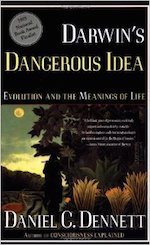 Evolution
Evolution
Dennett’s Algorithm: An Exercise in Circularity
In Darwin’s Dangerous Idea (DDI), Daniel Dennett reduced natural selection to an algorithm, or a set of mindlessly repeated steps.
But as far as I can see, he never tells us exactly what these steps are. I have looked long and hard. However, the omission is helpfully redressed by a Dennett admirer named Vincent Poirier in an Amazon comment on DDI. He identifies the Darwinian (Dennettian) algorithm as a four-step process:
- Organisms pass their characteristics on to their descendants, which are mostly but not completely identical to their parent organisms.
- Organisms breed more descendants than can possibly survive.
- Descendants with beneficial variations have a better chance of surviving and reproducing, however slight, than those with non-beneficial variations.
- These slightly modified descendants are themselves organisms, so repeat from Step 1. (There is no stopping condition.)
Poirier continues:
That’s it. That’s all there is to Natural Selection: a simple four step loop; a mindless algorithm that displays no intent, no design, no purpose, no goal, no deeper meaning. This simple algorithm has been running on Earth for four billion years to produce every living thing, and everything made by every living thing, from the oxygen atmosphere generated by plants to the skyscrapers and music created by man. Dennett writes that it is the algorithm’s complete mindlessness that makes Darwin’s idea so dangerous.
 You may have noticed that Poirier’s third step ("beneficial variations have a better chance of surviving and reproducing [than those without them] . . . ") is a truism. The beneficial variations are defined in terms of those that survive. Therefore, one might say, Dennett’s algorithm never comes to grips with the real world.
You may have noticed that Poirier’s third step ("beneficial variations have a better chance of surviving and reproducing [than those without them] . . . ") is a truism. The beneficial variations are defined in terms of those that survive. Therefore, one might say, Dennett’s algorithm never comes to grips with the real world.
"The survival of the fittest" has the same problem. It is circular. Fitness is defined in terms of survival, and there is no independent criterion of fitness. I think Dennett is aware of this problem, which is why (as far as I can see) he made no attempt to address it in his book. He omitted Step 3.
Dennett makes a comparable error when he identifies an algorithm that will bring you untold riches on the stock market: "Buy low, sell high." Then repeat as long as you like. No stopping point.
Hey, why didn’t someone tell stock brokers that! It could make us all rich.
Could it? Not in the real world. The problem with this algorithm is that in real markets no one can identify "low" and "high." They are relative terms. ("If only we knew at the time it was at a high!") Ditto in natural selection. No one knows at the time what a "beneficial variation" is. But retrospectively, we do. It is one that survives in offspring.
In The Origin, Darwin gives only one case in which he identifies a variation that is independent of survival. He imagines a wolf endowed with greater speed in an environment where prey are scarce. But obviously stronger leg muscles in a wolf could produce thousands of problems. If you try to guard against all such unforeseen eventualities, you will end up claiming that a mutation that enables a wolf to catch scarce prey will allow it to catch scarce prey.
In short, natural selection makes a circular claim, Dennett does his best to skirt the problem, but no one has been able to get around it.
